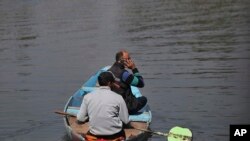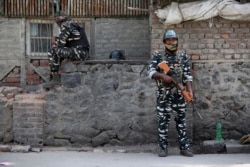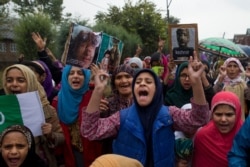India restored mobile phone service to about 4 million people in Indian Kashmir Monday, in a step aimed at restoring normalcy, 10 weeks after New Delhi downgraded the region's semi-autonomy and imposed a security and communications lockdown.
Although the restoration of service is a huge relief for many residents, it remains to be seen whether business as usual will return to Kashmir, whose streets and markets remain largely deserted due to what some compare to a campaign of civil disobedience.
A hotel owner in Kashmir, Wasim Chaya, was among the millions overjoyed at being reconnected. “I am very happy, I am feeling very good; I have made and received six calls in one hour,” he said.
About 2 million prepaid mobile phones have not been restored and internet services also continue to be suspended.
Authorities called the partial restoration of mobile services a “barometer of returning normalcy” to the Himalayan region where life remains disrupted since India cut off phone services and the internet, detained scores of local politicians and poured in thousands of troops to prevent unrest after it downgraded the status of its only Muslim majority region.
Despite the easing of curfew-like restrictions in recent weeks, shops in the Kashmiri capital, Srinagar, usually open only for a couple of hours in the morning and evening, keeping shutters down during the day. Public transport has mostly been absent and there are virtually no students in schools and colleges which reopened weeks ago.
It is not clear whether the continued shutdown is due to popular anger at New Delhi’s action in downgrading Kashmir’s status or fear of Islamic militants in a region wracked by a violent separatist insurgency. Ordering shutdowns was a popular protest tactic used by separatist leaders and militants.
Authorities are blaming separatists. Full-page advertisements issued by authorities in a local newspaper on Friday urged people to reopen their shops and send children back to school. The ads asked, “are we going to succumb to militants?”
Residents and observers say the mood in the valley is sullen and defiant. “There is a certain spontaneity with the way people have reacted,” says Noor Mohammad Baba, a political analyst in Srinagar. “There was a lot of resentment, a sense of humiliation at the way things were done and people were completely disconnected from the world and each other also. It just came as an imposition.”
Hotel owner Chaya agrees that anger continues to simmer. “We were not consulted and were virtually locked up. And it all happened at a time when people were getting ready for the major festival of Eid,” he recalls.
Chaya has voiced optimism that the reconnection of service will improve the situation. “We want normal conditions to return. We want our business to resume,” he says, pointing out that they have faced complete losses for two months.
New Delhi said the communication blackout was imposed to prevent militants from using social media and the internet to provoke protests.
Restoring mobile phone services was the second step in a week to lift the harsh restrictions imposed in the region. Last week, the government lifted a restrictions on tourists, who were ordered to leave in August because of security concerns.
New Delhi has said the steps it took to scrap Kashmir’s autonomy were necessary to bring the region into the mainstream and ensure its development.
Speaking at an election rally in the western state of Maharashtra on Sunday, Prime Minister Narendra Modi said it would not take more than four months for life in Jammu and Kashmir to return to normal.
But many observers say they are not sure. “It is too early to say, 'I don’t think people are going to open markets soon,'” says analyst Baba. Still, he says he is happy at being able to call his family. “If you put someone in jail and then let them out, it is a relief.” But he points out that he still has to ask his daughter in Delhi to check his e-mail for messages.






